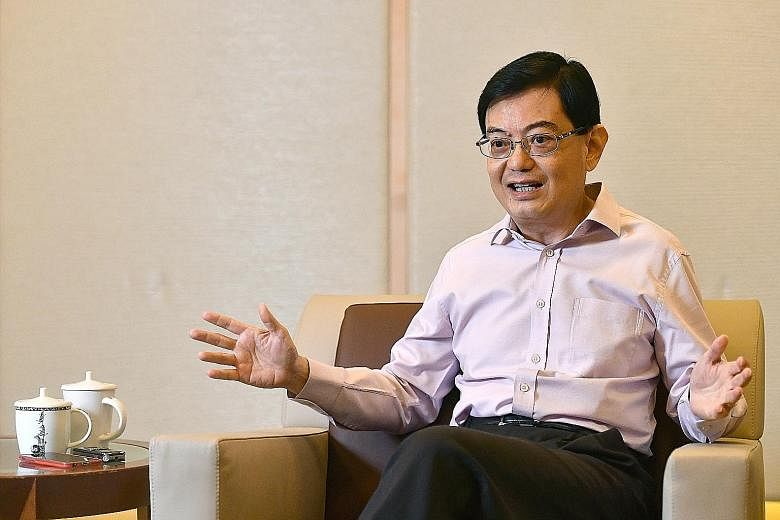Developments in the global economy, including structural changes in the Chinese and American economies, and technological disruptions, will bring upheaval in the next few years.
But they also present opportunities for Singapore, which has to prepare itself to catch and ride the wave, Finance Minister Heng Swee Keat said.
He was giving an insight into what has been on the minds of the committee tasked with charting a blueprint for long-term growth, ahead of the release of its report on how Singapore can prepare its economy for the future.
"On the one hand, there are new opportunities that we need to look for, and on the other hand, we need to build capabilities that will allow us to continue to do well," Mr Heng said in an interview last week.
"What that means is that it is going to be quite a bit of work to get into a better position."
The Committee on the Future Economy (CFE), which he chairs, has factored in these major shifts in devising strategies for Singapore's growth in the long term, he added.
He also indicated that next year's Budget will likely respond to some of the committee's recommendations, and touch on restructuring and the broader challenges at hand.
Mr Heng's comments come at a time of growing anxiety about Singapore's economy, which shrank 2 per cent in the July to September quarter compared with the preceding three months.
The official growth forecast for this year was also recently lowered to 1 per cent to 1.5 per cent, from an earlier estimate of 1 per cent to 2 per cent.
Observers have said the economy is in need of a fillip, and are keenly awaiting the CFE's report.
Asked about the situation, he said: "I won't say that I am worried in the negative sense. But I do see that there are new challenges that we will have to deal with."
These include, for instance, China's move away from an export- and investment-driven economy to a consumption and services economy, the policy uncertainties of a Donald Trump presidency in the United States, and the trend of digitisation - all of which will have an impact on Singapore's economy.
"If you think about the changes that are happening, we will have to organise ourselves differently... We have to build new capabilities," said Mr Heng.
This will involve training Singaporean workers so they can build deep skills and helping companies with research and development to boost innovation, he said.
Alongside that, the Government and businesses will have to "think of how we can work even better together", he added, citing the track record of a good tripartite relationship and economic agencies that have been facilitative for businesses and training.
Mr Heng acknowledged that the changes will cause some disruption to people. But he is optimistic because the groundwork has been laid with schemes such as SkillsFuture, and Singapore having always had a pro-business stance.
"We are building on strengths built up over the years," he said.
Asia is also expected to remain the fastest-growing region of the world despite the global slowdown, and Singapore is in a good position to be part of the growth, he added.
The CFE, which had its final meeting earlier this month, has held more than 80 discussions with over 1,000 students, educators, parents, union members, business leaders and academics. Its 30 members have also taken part in events where they reached out to more than 6,000 people.
The CFE will release its recommendations early next year on how Singapore should position itself in the years ahead.
Its report will touch on five key themes of the digital economy, jobs and skills for the future, Singapore as a connected city, innovation, and governance.
Pointing to the previous economic restructuring reviews - such as the Economic Strategies Committee in 2009 chaired by Deputy Prime Minister Tharman Shanmugaratnam, who was then Finance Minister, and the Economic Review Committee chaired by Prime Minister Lee Hsien Loong in 2001, when he was Deputy Prime Minister - Mr Heng said such exercises help to build a common understanding of the challenges the country faces.
He added: "By gathering all these inputs together... we will be able to build the sort of shared understanding and be determined to take action that is necessary for us to forge ahead."


